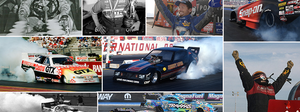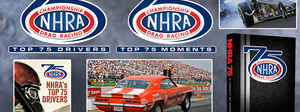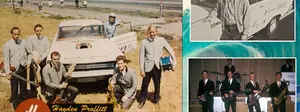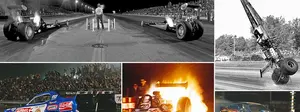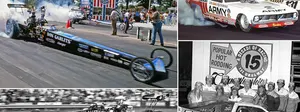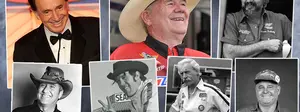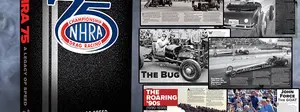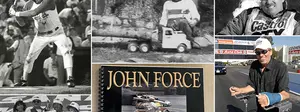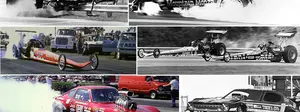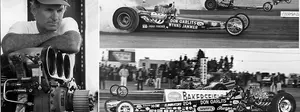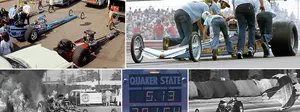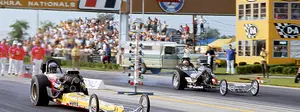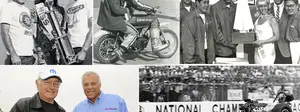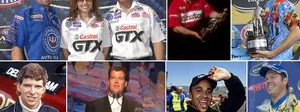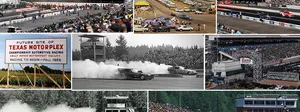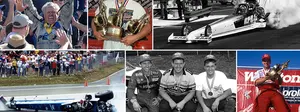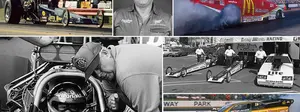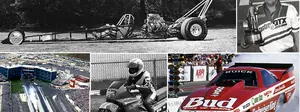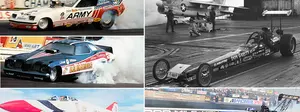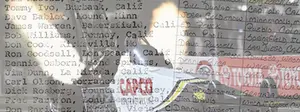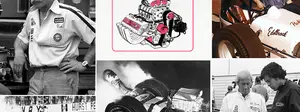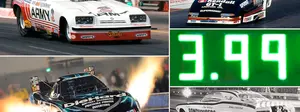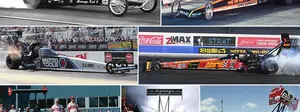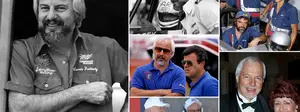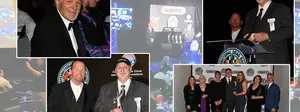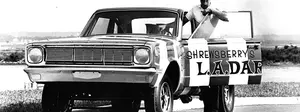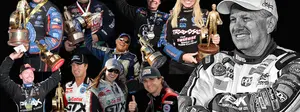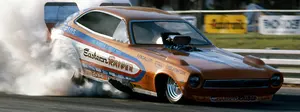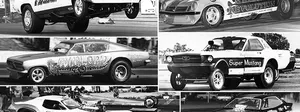NHRA's Euro hero: 'No Jive Clive' Skilton
Some ado was made about European FIA champ Urs Erbacher’s first-round Top Fuel victory in Houston, which, as best as anyone’s records can tell, was the first round-win by a European Top Fuel racer in more than 30 years. A lot of European racers have competed at NHRA events, but the hands-down most successful European driver in NHRA history is Englishman Clive Skilton, who reached the final round of the 1977 Springnationals, where he lost to Shirley Muldowney.
 |
|
 |
 |
Skilton, the first to record seven-second (1969), 200-mph (1971), and six-second Funny Car (1975) passes in England and a member of the British Drag Racing Hall of Fame, and fellow Brit Dennis Priddle first competed on U.S. soil at the 1973 Winternationals, which was twice delayed by rain. Skilton was wheeling Carl Olson and Mike Kuhl’s former dragster, which had won the event the year before. Both qualified (Priddle 25th, Skilton on the 32-car bump), but neither could stay for the event’s completion.
Skilton returned to the United States in late 1976 not only to compete, but also to take up residence in Balboa, Calif. “No Jive Clive,” as he was nicknamed (remember, this was the ‘70s), ran several national events and a ton of match races in 1977 against the likes of Don Garlits, Muldowney, and Gary Beck, but the highlight undoubtedly was in Columbus, Ohio, where he qualified 10th with a 6.09 and defeated Tony Ceraolo, Sid Seeley, and Johnny Abbott.
Garlits, who had raced against Skilton in England, lost early and assisted Skilton and crew chief Bernie Lewis for the duration. Muldowney, who had won her first career title at this event the year before, qualified No. 1 at 5.99, 242.58 (low e.t and top speed) and was the big favorite. Skilton put a wheel on her at the green and held on for most of the way before his Donovan powerplant threw a rod. Muldowney squeaked by for the win, 6.11, 236.22 to 6.15, 228.42.
Those were not Skilton’s final NHRA round-wins. Overshadowed by his Columbus runner-up was a semifinal showing in that year’s 32-car U.S. Nationals field. He qualified 10th (6.03) and beat John Hilton, Grant Stoms, and Hank Johnson before losing to Richard Tharp, 6.13 to 6.15. He qualified at the 1977 Finals in Ontario, Calif., with a career-best 6.01 but lost first round, then scraped together enough funds to begin the 1978 season in Pomona, but a cracked chassis from tire shake ended his U.S. efforts.
He went to work in the new-car business and in 1987 purchased a Jeep dealership in California that was number one in world from 1988 to 1993. Today he runs JeepSpeed, a five-race off-road-racing series. I tracked him down through JeepSpeed the day after celebrating his 67th birthday, and he was happy to reminisce.
“We had some incredible times,” he recalled, “especially the match races that I ran to survive financially. It was the lady, the limey, ‘Big Daddy,’ and the Canadian. We ran all over together, and I even set track records at San Antonio and Pueblo, Colo. I ran a best–of-three against Garlits in Jackson, Miss., and beat him three of three, and the track operator got mad at me because I killed his beer and hot dog sales, but it was a thrill to run against them all. It was a great experience.”

 |
The loss of Pat Foster is still reverberating. There have been some great tributes posted by those who knew him best; you can find a repository of them here.
One of the most touching items I received came from Adam Sorokin, the son of the late Surfers pilot Mike Sorokin. I’ve followed Adam’s burgeoning driving career and stayed in touch, and when told of his relationship with Foster, I prompted him for details.
“Patty and I were close," said Adam, pictured here with Foster. "He was a father figure, a mentor, and a hero to me. Patty was indeed bigger than life to me for a number of reasons, but mainly, he was one of those very few people you meet in your life that were 'the real deal.' It's obvious when you meet someone like that; you know it when you see it. I met Patty through Tom Jobe (another ‘real deal’) and instantly took a liking to him. Our relationship was not unlike father and son. When I was just starting to drive, he was always just a phone call away for me to bounce ideas off of and, mostly, to just shut up and listen to and maybe learn a few things from. We talked on the phone maybe once every other week or so from the first day I met him over 10 years ago until last week when I flew up to Idaho to say goodbye for the last time.
"Pat Foster was a bad ass (in the best of ways, too). He could build 'em, tune 'em, and literally drive the wheels off of any car he got in. He was a driver's driver, and his exploits are legendary (and I don't use that term loosely). His ability to nonchalantly tell you one of the best 'hero driver' stories you ever heard always endeared him to me and anybody lucky enough to be in earshot of his deep booming voice. To hear his patented "What the *&$#@" or "I ain't no weak suck!" was just 'heaven' on the ears ...
"Here's one of my favorite Patty stories. I wish I would've recorded it for all the particulars of time, place, etc., but it doesn't matter anyway.
"Foster was wrenching on his Funny Car one night at a match race at some back East track. A fan comes up to him a little nervously and asks if he would mind signing his autograph on a butterfly steering wheel he was clutching in his hands. Foster says, 'Sure, can I hold on to it and sign it when I get back from this run?' 'Sure! Thanks!' says the fan. This whole deal goes down without anybody knowing about it. Well, Pat is now in his Funny Car on the starting line, his car sounding ‘bad to the bone’ (as Patty would say) and he's just completed his dry hops. He moves in to pre-stage his car. The top light goes on. Everybody, including his owner, is on the line watching with that nervous tension that develops right before YOUR car gets ready to haul ass down the track. All of a sudden, the team sees what looks to be a steering wheel fall out the window and onto the track! As their collective minds compute what just happened and think, 'Oh my God; how's he gonna steer that thing?' Patty bumps her in and stages the car. The light comes down, and he's off! Straight down the track, flames over the roof, not missing a beat. The team just stands there looking at each other dumbfounded as to what just happened. It wasn't until they picked Foster up at the top end that they learned of that fan's steering wheel being in the cockpit with him.
"On my last visit with Patty, we talked about all things and sometimes we just watched TV together without saying a word. Even on the verge of death, he was the baddest [expletive] around! He was comfortable with his choice and he was matter of fact as only Pat Foster could be about his life and impending death. I was able to tell him I will miss him, I love him, I've learned from him, and I will always remember him. I also told him how universally loved he is (not just for drag racing/hot rod stuff). He told me how much he cares for me and how proud he is of me. As he put it, he doesn't ‘get buttered up to too many people --you have to EARN it’ -- and said I was one of them, which makes me immensely proud. After our visit, I came to the conclusion that Pat Foster was a driver. He didn't get driven. He, and he alone, had his own foot on the throttle of his life and when he stepped off, he was through the lights. He backdoored that bitch, too!"



